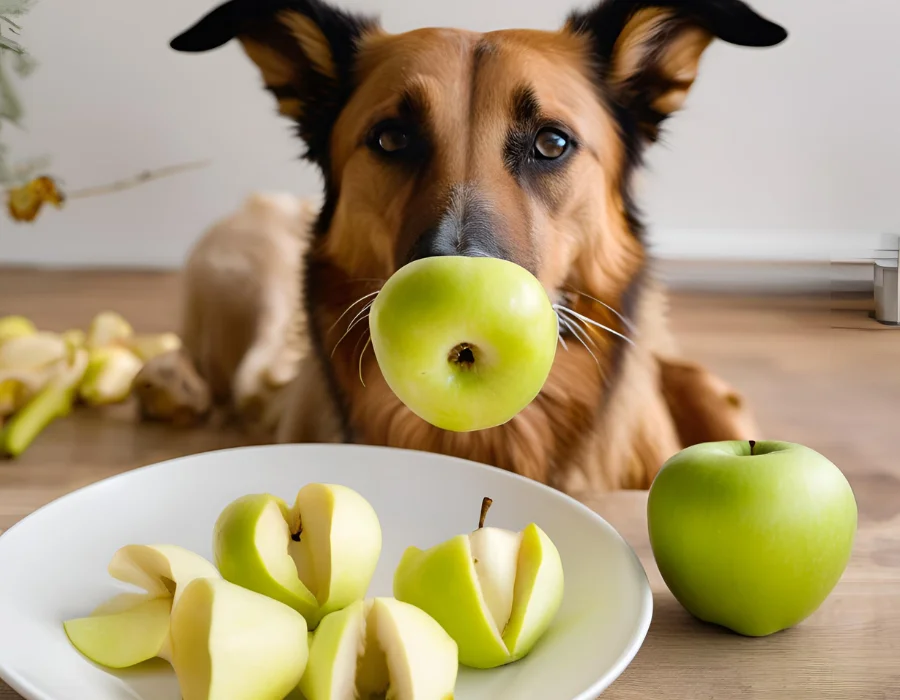Apples are a nutrient-dense fruit that can be a healthy and delicious dog treat. Many pet owners enjoy sharing this crisp, sweet fruit with their furry pals, but there are some crucial precautions to take. While apples are high in vitamins and fiber, particular fruit components, such as seeds and cores, can be hazardous to dogs due to cyanide.
In this post, we’ll go over how to feed apples to your dog safely, the risks associated with apple seeds, whether apple skins and sauces are safe, and how you can give other fruits to your pet.
Health Benefits of Apples to the Pets
When served properly, apples can offer several health benefits for dogs and other pets:
- Vitamins
Apples are rich in vitamins A and C, which support various aspects of your dog’s health.- Vitamin A: Promotes good vision, healthy skin, and a strong immune system.
- Vitamin C: Plays a key role in boosting the immune system and helping the body ward off infections.
- Fiber
The fiber in apples is beneficial for your dog’s digestive health.- It helps regulate bowel movements, making it useful in preventing constipation and promoting regularity.
- Fiber also helps your pet feel fuller for longer, reducing the urge for frequent snacking.
- Antioxidants
Apples are a great source of antioxidants, which combat harmful free radicals in the body.- These antioxidants aid in reducing inflammation and contribute to overall health.
- Dental Health
The natural crunch of apple slices can help improve your dog’s dental health.- Chewing on apple pieces may reduce the buildup of plaque and tartar on the teeth.
- The crisp texture helps clean the teeth and massage the gums naturally.

Cyanide poisoning in pets
Apple seeds contain a chemical known as amygdalin, which can be converted into cyanide in the digestive system. Cyanide is a poisonous chemical that impairs the body’s capacity to transfer oxygen, potentially inflicting severe injury.
While swallowing a few seeds may not be immediately problematic, large amounts can offer a considerable health risk to dogs and other animals. To protect your dog’s safety, remove all of the seeds before serving apples.
Apple Seed Toxicity in Dogs
The level of toxicity from apple seeds can vary based on a pet’s size and the amount consumed, with smaller dogs being more susceptible to poisoning. As the quantity of seeds ingested increases, so does the risk of toxicity. Even moderate consumption over time can be harmful.
Symptoms of Cyanide Poisoning
Signs of cyanide poisoning in dogs may include:
- Vomiting
- Diarrhea
- Difficulty breathing
- Weakness or lethargy
- Rapid heartbeat
If your dog exhibits any of these symptoms after consuming apple seeds, seek veterinary assistance immediately.
Can Dogs Eat Apple Cores?
While dogs can technically eat apple cores, it is not recommended. The core is tough to chew and can pose a choking hazard, especially for small dogs. Additionally, the seeds within the core should always be removed due to the risk of cyanide toxicity.
Apple cores are not recommended for dogs:
Blood Occlusion
Apple cores are tough and mucilaginous, which can pose a risk to small dogs. When consumed, the dense texture can disrupt blood circulation in the digestive tract, potentially causing choking in the throat or esophagus. This can lead to breathing difficulties and even physical harm.
Digestive Obstruction
Apple seeds and cores are hard and difficult to dissolve, increasing the risk of gastrointestinal blockages. If a blockage occurs, it can cause severe abdominal pain, vomiting, and other symptoms. In some cases, surgical intervention may be required to remove the obstruction.

What if Your Dog Has Eaten an Apple Core
If your dog accidentally eats an apple core, follow these steps:
- Stay Calm: Monitor your pet closely for any signs of discomfort.
- Check for Symptoms: Look out for signs of potential poisoning, especially if your dog ate a large amount.
- Contact a Veterinarian: If any symptoms appear or you’re concerned, seek veterinary assistance immediately. Avoid attempting to treat your pet yourself.
Symptoms of Apple Seed Poisoning in Dogs
Poisoning symptoms can range from mild to severe. Common signs include:
- Vomiting and Diarrhea: Often the first indications of digestive upset.
- Difficulty Breathing: May suggest a significant drop in oxygen levels.
- Weakness or Lethargy: A sign that your dog is unwell and may need medical attention.
- Seizures or Convulsions: These are critical symptoms that require urgent veterinary care.
If your pet exhibits any of these symptoms, contact a vet immediately.

To give apples to your pet, follow these steps:
Wash Thoroughly
Always wash apples before serving to remove any chemicals, pesticides, or other residues that may be present on the skin.
Remove the Core and Seeds
Core the apple and remove all seeds to prevent choking and reduce the risk of cyanide poisoning. Cut the apple into small, bite-sized pieces to make it easier and safer for your dog to eat.
Serve in Moderation
Offer apple slices as an occasional treat rather than a regular part of your dog’s diet. Overconsumption of fruits can lead to digestive upset, including stomach aches or diarrhea.
Monitor for Reactions
When introducing apples to your dog’s diet, start with small amounts and watch for any adverse reactions, such as allergies or digestive discomfort. This will help ensure your dog tolerates the fruit well.
How many apples are fit for a pet?
Treat, Not a Meal
Apples should be given only as a treat, not as a main meal. They can be a tasty addition to your dog’s diet, but moderation is key.
Portion Recommendations
- Small Dogs: Offer a few small slices or bite-sized pieces of apple.Medium and Large Dogs: A medium-sized apple, chopped into manageable pieces, can be given.
Observe Your Dog
Pay attention to any signs of discomfort, such as coughing, vomiting, or signs of pain after consuming apples.
Watch for Symptoms of Distress
Be aware of potential symptoms, including vomiting, weakness, or difficulty breathing, which may indicate a problem. If these symptoms occur, seek veterinary care.
Consult a Veterinarian
If you notice any discomfort in your dog or have questions about the appropriate amount of apple to feed, consult a veterinarian. They can confirm whether any treatment is necessary and guide safe feeding practices.

Frequently Asked Questions
Are there certain fruits dogs can’t eat?
Yes, some fruits can be harmful to dogs. Grapes and raisins can damage a dog’s kidneys. Citrus fruits can upset a dog’s stomach. Avocados contain a substance that can be toxic to dogs. It is important to check that the fruit is safe before giving it.
How many apple seeds are poisonous to a cat?
Apple seeds do not have a specific toxicity level, but even a small amount can be toxic because they contain cyanide. Therefore, it is better not to give apple seeds to cats.
How soon does cyanide poisoning appear?
Cyanide poisoning is quick-acting, and symptoms usually appear within a few hours. Symptoms include vomiting, difficulty breathing, and weakness. If in doubt, contact a veterinarian immediately.
But how much amygdalin can kill a dog, and how many apples does it take?
The lethal dose of amygdalin depends on the dog’s health and size. Large numbers of apple seeds (more than a hundred) can be dangerous. So don’t give apple seeds to dogs.
Can dogs eat apple skins?
Yes, dogs can eat apple skins. It’s safe and provides extra fiber and vitamins, but apples must be washed thoroughly to remove any chemicals.
Can dogs eat applesauce?
Yes, dogs can eat a limited amount of pure applesauce. The sauce must contain no added sugars, spices, or artificial sweeteners, and must be free of xylitol, which is toxic to dogs.
Can dogs eat bananas?
Yes, dogs can eat bananas. It is a good source of vitamins and potassium, but should be given in moderation due to its sugar content.
Can Dogs Eat Blueberries?
Yes, dogs can eat blueberries. They are low in calories and high in antioxidants, vitamins, and fiber.
Can a dog eat cheese?
Yes, dogs can eat a limited amount of cheese. It is a good source of protein and calcium, but caution should be taken due to its high fat content. See if your dog has a milk intolerance.
Is cyanide a cumulative poison?
Cyanide is not a commonly accumulated poison. It does not accumulate in the body over time, but can cause immediate and severe effects. Immediate treatment is essential in case of cyanide poisoning.
How many apples per week can be dangerous to give my labrador?
It is generally safe to give your Labrador a few slices of apple a week. Do not make apple treats more than 10% of their daily intake to avoid any digestive upset or imbalance.
What other fruits contain cyanide?
Other fruits that contain cyanide include cherries, peaches, plums, and dates. The seeds or kernels of these fruits contain amygdalin. Keep pets away from these areas to avoid cyanide poisoning.
Consequently, while apples can be a healthy treat for pets when given correctly, it is important to avoid apple cores and seeds to avoid injury risks and toxic reactions. By following these guidelines, you can safely share the benefits of apples with your pets, ensuring their health and happiness.
